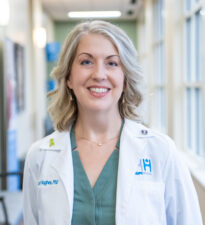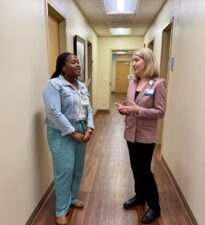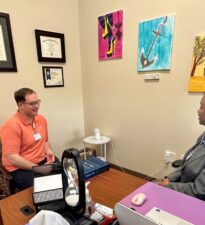Welcome!
The Behavioral Health Department is pleased to offer placements for graduate students enrolled in affiliated training programs in the fields of social work, counseling, and psychology. Please take a moment to read more about the Department and the various training settings that we offer.
Department Overview:
The Behavioral Health Department is comprised of a large team of approximately 25 licensed counselors, social workers, and psychologists who provide clinical services across three programs. In addition, they frequently collaborate with providers from other disciplines, including primary care, pediatrics, psychiatry, pain management, infectious diseases, endocrinology, women’s health, and dental services, to name a few.
Primary Care Behavioral Health:
Behavioral Health Consultants (BHCs) are behavioral health professionals that are integrated into medical settings, including primary care, pediatrics, infectious diseases, the comprehensive pain management program, and school-based clinics. BHCs serve in a hybrid role: Some patients are scheduled for more traditional, psychotherapeutic services, while others are seen via same-day warm handoffs or for more urgent needs. BHCs work closely with other disciplines to provide whole-person care for HopeHealth medical patients.
BHCs work with patients to address:
- Mental health concerns
- Health behavior changes
- Factors impacting medical conditions
- Emotional and behavioral crises
Mental Health Counseling & Psychology:
Mental health counselors and psychologists provide more traditional, outpatient psychotherapeutic services. They treat both patients of HopeHealth and patients who receive their health care elsewhere. Patients may be referred by another provider or they may self-refer for services. Some providers treat children, adolescents, and adults.
Examples of concerns that are treated in mental health counseling and psychology include:
- Mood and anxiety disorders
- Traumatic stressor disorders
- Personality disorders
- Behavioral factors impacting ADHD
- Child behavior management
- Poor marital/relationship health
Substance Use Disorder Treatment:
Our substance use counselors work closely with providers of medication-assisted treatment (MAT) as well as Patient Care Navigators (PCNs) to support patients along their recovery journey. A person does not have to be a HopeHealth medical patient to enroll in the SUD Treatment Program, nor do they need a referral from a medical provider to seek services. Counselors provide a thorough initial assessment to help determine patient needs and goals prior to engaging in services.
Difficulties commonly treated in the SUD Treatment Program include:
- Substance misuse/desire to quit
- Alcohol use disorders
- Opioid use disorders
- Cocaine and other stimulant use disorders
Graduate Student Placement:
After being selected for a training placement, graduate trainees may be placed in any or all of these settings. Placement depends on a number of factors, including student location, primary preceptor, program requirements, and career goals. For more information, please contact Hannah Stallings at hstallings@hope-health.org.



